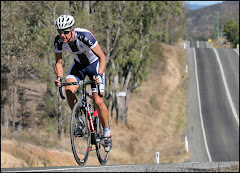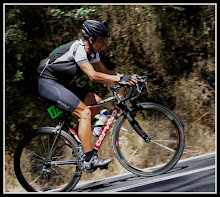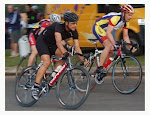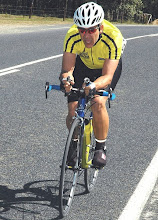It rains non stop out there and it is very cold. One will need to be really, really determined or get paid a few hundred Euros to get out in this weather to train. As a young surfer in the 70-80s, I would check the surf in any weather and if there was a slight sign of a swell and the wind came from any direction but direct from the sea (onshore wind), I would be out there, for hours... And often, I would do the surf-check on a bicycle. I also remember riding the bike, with a surfboard under my arm, battling the wind to get to the best surf spot of the day, normally a couple of kms north or south along a coastal road.
I guess everything has changed now. To start, this is a colder winter than the one I experienced in my years as a youngster. Then, if it was raining, it didn't really matter as I was going to get wet in the surf anyway and in winter the water was usually warmer than the air, so being in the ocean was actually nice. Riding a bicycle in the rain isn't the same anymore. I guess, as one gets older, environmental factors play a greater factor when deciding to leave the warmth of the house for any reason.
Before those days still, and that has nothing to do with the weather now or then, I remember riding my bike to school. I was 14 or 15 and living in the centre of one of the busiest suburbs in Rio, Copacabana. It was a 10 or 12 km ride to the suburb of Botafogo which I did on my race converted, steel frame, single-speed Caloi bicycle. It was the best part of my school experience at the time. I had to ride on the road as there were too many pedestrians, ice cream and hotdog vendors, newspaper and magazine stalls and cars, on the footpath.
Yes, cars. As the parking areas were completely full, drivers often parked their cars in any space they could fit their cars. Many times with the assistance of a "street valet", who would ask for a small amount of cash for their services of directing drivers to a parking spot. These guys would always insist that the drivers didn't apply the hand-break so he could move the car back and forth and fit another one if needed.
Riding on the road was very exciting as the streets were always packed with private cars, taxis and buses. And for some reason, everyone seemed to be in some kind of hurry and drove as if they were getting points for getting to the next red light. A bit like some drivers in Brisbane nowadays , except that Brazilian drivers always found small gaps that enticed them to move across two or three lanes to gain two or three meters on their fellow "racers". Interesting when those maneuvers were performed by bus drivers...
So, to me, the only way to claim a little piece of the road for my commute to school or any other destination, was to travel at the same speed, or faster, and as offensive as possible to stay out of trouble. Hence, a tactical way of zig-zagging from lane to lane and in between cars was cultivated many years ago. Sure, there were a couple of close calls (it happens when one is racing a VW taxi and a bus comes out of the bus lane and cuts you off...) but I don't remember been abused or sworn at even once while on the bike. I guess drivers were a little more tolerant those days as there weren't many cyclist on the busy streets. In fact, I rarely met anyone riding a bicycle on the streets of Copacabana.
Perhaps, that's where my competitive character comes about when on a bicycle, being in a race or even more, being in the traffic.

Tour de France: Stage 17, Embrum to L'Alpe d'Huez, 210.5 km
What else can I write but how magnificent the work of Team CSC-Saxon Bank was? It was a show of selfless performances by all riders with only one goal in mind: a win for the Team.
I loved Sastre's attack and win and was hoping for Andy in the sprint for second. I don't think Andy Schleck had any other task but to work for his brother, Frank, and for Carlos Sastre. That was his job. So were the jobs of O'Grady, Cancellara, Arvensen, Voigt, Gustov and Sorensen. And everyone in that team deserved their pay for the day... They not just delivered a Stage win on L'Alpe d'Huez, which in itself is something not less than historical but they put Carlos Sastre in yellow and 1'34" ahead of Cadel Evans, the 2008 Tour favourite and possibly strongest GC rider.
If that is enough for a win in Paris, and everyone is saying "No", I don't know but I think Scott Sutherland (team manager)knows better than most about such mathematical circumstances and would have a few more cards to play.
That will make Stage 18 a very exciting one as "The Team" will be again firing all guns to gain a few more seconds on the Australian, and lets not forget the Russian Menchov, a strong man in any discipline.
For now:
Viva Sastre!!!
Stage Result:
1. Carlos Sastre (Spa)
2. Samuel Sanches (Spa)
3. Andy Schleck (Lux)
Ride of the day: Peter Velits
Rider having most fun on the day: Andy Schleck
Rider of the day: Carlos Sastre (by more than 2 min)
Domestique of the day: Stuart O'Grady
Best Team: Carlo's Team
Not so pleasant, I reckon.
Before I publish this post, I need to mention two points that came to my attention and keep bothering me as I follow commentaries and read articles on the Tour. The first one came about as I read a couple of interviews with Lance Armstrong who gave his opinion on the favourite riders and best teams for this year. Not once he mention the CSC-Saxon Bank Team and failed to highlight any of its riders. What is about this guy, is he still that focused that he can't acknowledge that a team better than his old one exists?
The second one comes from some of the Australian media which keeps using the term "bullying" when describing Team CSC-Saxon Bank's race tactics in the 2008 TdF. The follow is an extract from Wikipedia:
"Bullying is the act of intentionally causing harm to others, through verbal harassment, physical assault, or other more subtle methods of coercion such as manipulation. Bullying can be defined in many different ways. Although the UK currently has no legal definition of bullying, [2] some US states have laws against it. Bullying is usually done to coerce others by fear or threat. [3]"
Surely a lighter and/or less detrimental term can be applied to describe the attacking and marking tactics used by Suart O'Grady's strong team. Certain journalist has even used the term thuggery to describe how they dealt with Tour favourite, Cadel Evans.
I have lost races when riders got together to cover my attacks, chased me down, etc. Yes, it really pissed me off as I thought they were ganging up on me, but it never came to my mind they were acts of thuggery.
Having said that, that was never in the Tour de France...












.jpg)

.jpg)




1 comment:
Great read, Mr AMR. You really brightened up my day with this post. Well written, informative and entertaining. I would also agree with your opinions.
Post a Comment